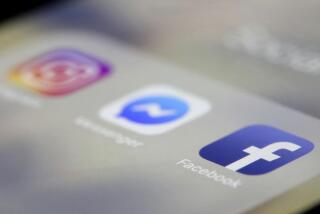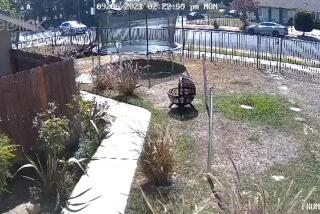Column: The bogus-check scam is back, in the form of a car-wrap offer
Scammers aren’t dumb — they stick with what works. It’s always interesting, though, when a classic ruse gets dressed up in new clothes.
In this case, we’re looking at a variation on a well-traveled bogus-check scam, rejiggered to attract people open to pimping their rides for advertising purposes.
Pay attention to how this works because it’s a con you’ll almost certainly see again.
Wilmington resident Jesse Marquez, 67, recently received a text message asking if he was interested in a so-called car wrap — that is, turning his 2010 Dodge Caliber hatchback into a rolling marketing campaign for Monster Energy, the energy drink characterized by a stylized M logo that looks like a claw mark.
The text said Marquez could earn $500 a week for 12 weeks, or $6,000, if he was selected to participate in the program. It linked to an online application, which Marquez filled out.
“The thing is,” he told me, “my brother has Stage 4 cancer and his insurance doesn’t cover everything. I could use the extra money to help him.”
This is common among scam victims, I’ve found. It’s not that they’re particularly reckless or naive, although those can be factors too. Rather, there frequently are extenuating circumstances that make a person vulnerable to being hoodwinked.
As with all successful scams, the trickery lies in the details.
After Marquez submitted his application, he started receiving text messages ostensibly from the company handling Monster’s marketing program. They began with innocent-seeming follow-up questions, such as “How many miles do you cover on a daily basis?” and “How long have you been driving?”
Marquez was asked to take a photo of his car and show where the decals would be placed. This part of the racket played out over several days.
Finally Marquez was told that he’d been selected for a car wrap. Actually, he was told he’d been “choosen,” which should have been a red flag that he likely was communicating with nonnative speakers, possibly based overseas.
“You will receive check of $1570, Once you get it you are to keep $500 your upfront weekly payment and the rest is for the decal artist who will come for the decal,” the text said in broken English. “I hope you understand?”
Marquez asked for more details about what the decals would look like. He promptly received a text that included a photo of a Monster-branded car.
It was a fake.
“Monster has no car-wrap program,” said Tamara Taylor, a spokeswoman for the Corona-based company.
“This is something that’s been going on for a while,” she said, adding that Monster Energy is cooperating with authorities investigating the racket. At this point, however, nobody knows who’s perpetrating it.
Marquez’s check arrived via a FedEx priority overnight shipment, which made it seem more legit. It also allowed the sender to track the package and know when it had arrived. Timing is everything in this fraud.
The check appeared to be issued by Excell Auto Group in Boca Raton, Fla. And, yes, a search for Excell Auto Group will turn up a legitimate company with the same street address as on the check.
Scott Zankl, owner of the Florida luxury-car dealer, told me he was aware his company’s name was being used by fraudsters but wasn’t sure what to do about it.
“We’ve been getting calls about this for the last few years,” he said. “It’s crazy.”
The next red flag for Marquez was that the size of the check he received was a lot bigger than what he’d been promised. It was for $2,570.86. This is generally a sign that the scammer believes a sucker is hooked and a bigger payoff is possible.
“Hello,” said an ensuing text message, “i tracked the payment just now and it has been delivered to your mailbox so how soon will you be getting it deposited?”
Subsequent messages encouraged Marquez to deposit the check and confirm the transaction as quickly as possible.
Here’s how the scheme typically plays out from there:
After the check is deposited, the scammer will say something to the effect that the decal artist is very busy and needs to be paid upfront to schedule time to come out and apply the decorations. Instructions will be provided to wire the money.
The con relies on the fact that it usually takes several days for a bank to clear a check, even though it will appear on your account that the deposit is complete.
If you immediately withdraw and wire the money as instructed, therefore, you’re not wiring just-deposited funds. You’re wiring your own cash.
And you won’t know you’ve been had until a few days later, when the bank informs you that the check has bounced.
That cash you wired? It’s irretrievable.
In Marquez’s case, he would have been out $2,070 of his own money (and wouldn’t have gotten the $500 he thought he was keeping for himself). However, he was saved at the last minute by his desire to share the wealth with others.
Before the check arrived, Marquez had asked the scammer by text if it would be OK if he encouraged a few friends and family members to also apply for the program.
Needless to say, the scammer said this was a great idea and instructed Marquez to forward the link to the online application to as many people as he wanted.
It was Marquez’s son who, after receiving his father’s text, was sharp enough to check online and see if this was a swindle. He told his dad not to deposit the check and not to send money to anyone.
For the last couple of weeks, Marquez said, he’s been stringing the scammer along as he’s tried to interest the Los Angeles Police Department, the L.A. city attorney’s office and the L.A. County district attorney’s office in the case.
“No one has gotten back to me,” he said. If so, that’s not surprising. Many law enforcement agencies lack the resources to investigate fraud and know these shenanigans frequently originate abroad, beyond their jurisdiction.
So Marquez called me.
Since he lost no money, this is a teachable moment for the rest of us.
“If you get a message urging you to deposit a check and wire money back, it’s a scam,” says the Federal Trade Commission. “Every time. No matter the story.”
The car-wrap angle is a nice twist — very modern, very alluring to people looking to make a fast buck.
However, as the FTC observes, “if this were a legitimate car-wrap opportunity, wouldn’t the company directly pay the car-wrapping vendor instead of asking you to do it?”
Marquez’s intentions were good: He wanted to help his ailing brother.
In almost all cases, though, just taking that extra moment to ask yourself if everything’s on the up-and-up can save you a bunch of heartache.
I asked Marquez what advice he’d give to anyone who receives a similar text message. His answer was a simple one.
“Don’t.”
David Lazarus’ column runs Tuesdays and Fridays. He also can be seen daily on KTLA-TV Channel 5 and followed on Twitter @Davidlaz. Send your tips or feedback to david.lazarus@latimes.com.







